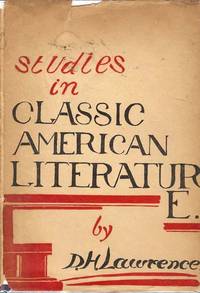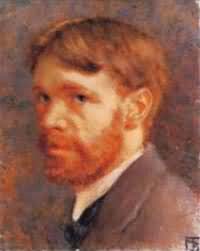I am not a mechanism, an assembly of various sections.
And is not because the mechanism is working
wrongly, that I am ill.
I am ill because of wounds to the soul, to the deep
emotional self
and the wounds to the soul take a long, long time.
only time can help
and patience, and a certain difficult repentance
long difficult repentance, realization of life’s
mistake, and the freeing oneself
from the endless repetition of the mistake
which mankind at large has chosen to sanctify.”
– D. H. Lawrence
Tag Archives: D.H. Lawrence
Studies In Classic American Literature – D H Lawrence
[Essay on Edgar Allan Poe]
“Love is the mysterious vital attraction which draws things together, closer, closer together. For this reason sex is the action crisis of love. For in sex the two blood-systems, in the male and female, concentrate and come into contact, the merest film intervening. Yet if the intervening film breaks down, it is death.
So there you are. There is a limit to everything. There is a limit to love. The central law of all organic life is that each organism is intrinsically isolate and single in itself. The moment its isolation breaks down, and there comes an actual mixing and confusion, death sets in. This is true of every individual organism, from man to amoeba.
But the secondary law of all organic life is that each organism only lives through contact with other matter, assimilation, and contact with other life, which means assimilation of new vibrations, non-material. Each individual organism is vivified by intimate contact with fellow organism: up to a certain point.”
So man. He breathes the air into him, he swallows food and water. But more than this. He takes into him the life of his fellow men, with whom he comes into contact, and he gives back life to him. This contact draws nearer and nearer, as the intimacy increases. When it is a whole contact, we call it love. Men live by food, but die if they eat too much. Men live by love, but die. or cause death, if they love too much.
There are two loves: sacred and profane, spiritual and sensual.
- In sensual love, it is the two blood-systems, the man’s and woman’s, which sweep up into pure contact, and almost fuse. Almost mingle. Never quite. There is the always the finest imaginable wall between the two bloodwaves, through which pass unknown vibrations, forces, but through the blood itself must never break, or its means bleeding.
- In spiritual love, the contact is purely nervous. The nerves in the lovers are set vibrating in unison like two instruments. The pitch can rise higher and higher. But carry this too far, and the nerves begin to break, to bleed, as it were, and a form of death sets in.
 The trouble about man is that he insists on being master of his own fate, and he insists on oneness. For instance, having discovered the ecstasy of spiritual love, he insists that he shall have this all the time, and nothing but this, for this is life. It is what he calls “heightening” life. He wants his nerves to be set vibrating in the intense and exhilarating union with the nerves of another being and by this means he acquires an ecstasy of vision, he finds himself in glowing unison with all the universe.
The trouble about man is that he insists on being master of his own fate, and he insists on oneness. For instance, having discovered the ecstasy of spiritual love, he insists that he shall have this all the time, and nothing but this, for this is life. It is what he calls “heightening” life. He wants his nerves to be set vibrating in the intense and exhilarating union with the nerves of another being and by this means he acquires an ecstasy of vision, he finds himself in glowing unison with all the universe.
But as a matter of fact this glowing unison is only a temporary thing, because the first law of life is that each organism is isolate in itself, it must return to its own isolation. Yet man has tried the glow of unison, called loved, and he likes it. It gives him his highest gratification. He wants it. He wants it all the time. He wants and he shall have it. He doesn’t want to return to his own isolation. Or if he must, it is only as a prowling beast returns to its lair to rest and set out again.
Studies in Classic American Literature
 “Men are free when they are in a living homeland, not when they are straying and breaking away. Men are free when they are obeying some deep inward voice of religious belief. Obeying from within. Men are free when they belong to a living, organic, believing community, active in fulfilling some unfulfilling, perhaps unrealized purpose. Not when they are escaping to some wild west. The most unfree souls go west, and shout of freedom. Men are freest when they are most unconscious of freedom. The shout is rattling of chains, always was.” [Pg. 6]
“Men are free when they are in a living homeland, not when they are straying and breaking away. Men are free when they are obeying some deep inward voice of religious belief. Obeying from within. Men are free when they belong to a living, organic, believing community, active in fulfilling some unfulfilling, perhaps unrealized purpose. Not when they are escaping to some wild west. The most unfree souls go west, and shout of freedom. Men are freest when they are most unconscious of freedom. The shout is rattling of chains, always was.” [Pg. 6]
– D H Lawrence



